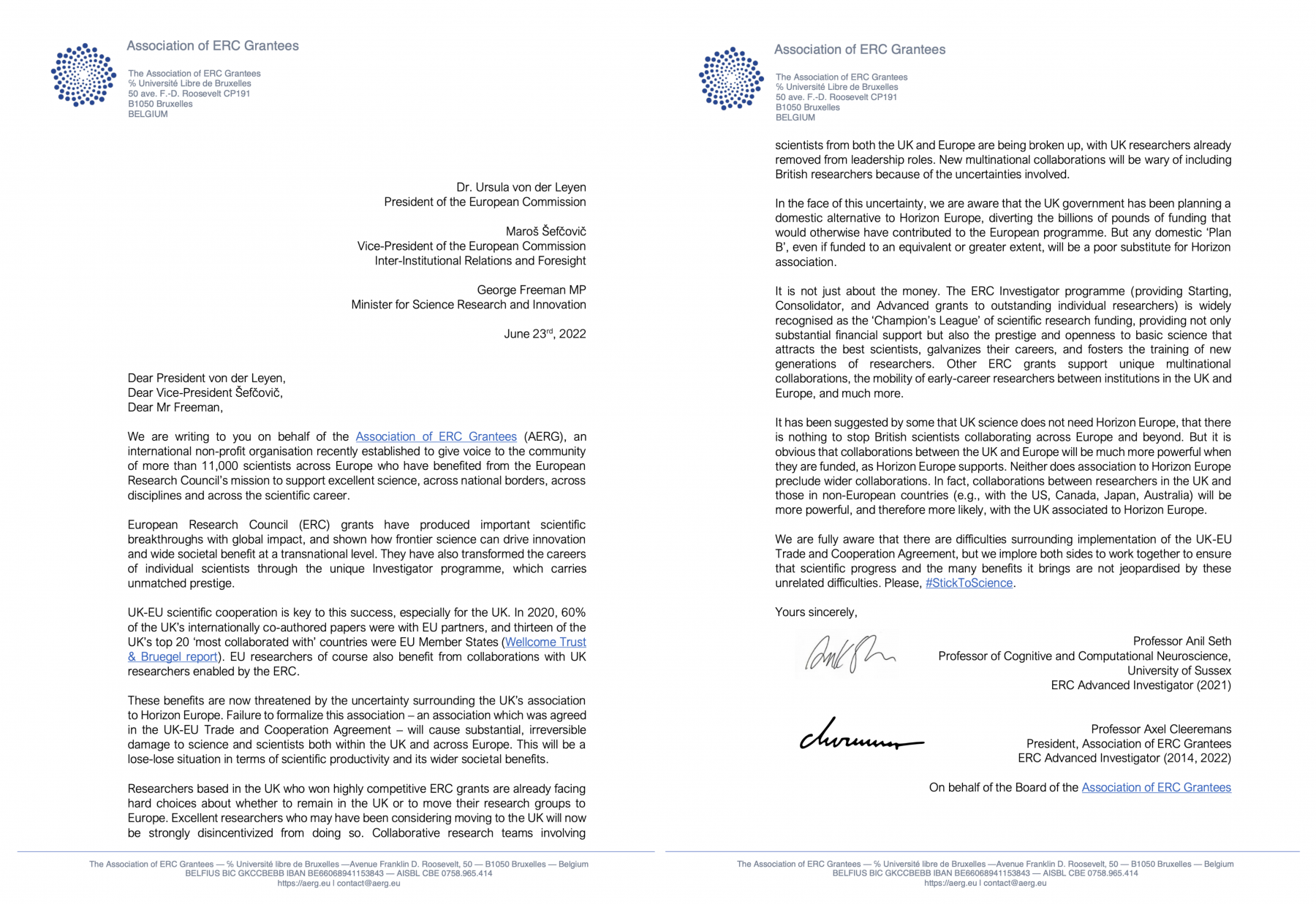AERG's Statement on EU-UK negotiations about the UK's association with the Horizon Programme
The Association of ERC Grantees, representing the 11K+ grantees of the European Research Council, is gravely concerned about the state of negotiations between the European Commission and the U.K. government about the latter's participation in the Horizon Programme.
It joins other voices in Europe (e.g., the stick-to-science initiative and Nature) in calling for a quick resolution that makes it possible for European Science to continue unimpeded by political considerations. Fundamental research is essential for knowledge-based societies, and none has supported it better than the European Research Council.

Open letter sent to EC President Ursula von der Leyen, Vice-President Maroš Šefčovič and U.K. Minister for Science, Research and Innovation George Freeman on June 23rd, 2022
June 23rd, 2022
Dear President von der Leyen,
Dear Vice-President Šefčovič,
Dear Mr Freeman,
We are writing to you on behalf of the Association of ERC Grantees (AERG), an international non-profit organisation recently established to give voice to the community of more than 11,000 scientists across Europe who have benefited from the European Research Council’s mission to support excellent science, across national borders, across disciplines and across the scientific career.
European Research Council (ERC) grants have produced important scientific breakthroughs with global impact, and shown how frontier science can drive innovation and wide societal benefit at a transnational level. They have also transformed the careers of individual scientists through the unique Investigator programme, which carries unmatched prestige.
UK-EU scientific cooperation is key to this success, especially for the UK. In 2020, 60% of the UK’s internationally co-authored papers were with EU partners, and thirteen of the UK’s top 20 ‘most collaborated with’ countries were EU Member States (Wellcome Trust & Bruegel report). EU researchers of course also benefit from collaborations with UK researchers enabled by the ERC.
These benefits are now threatened by the uncertainty surrounding the UK’s association to Horizon Europe. Failure to formalize this association – an association which was agreed in the UK-EU Trade and Cooperation Agreement – will cause substantial, irreversible damage to science and scientists both within the UK and across Europe. This will be a lose-lose situation in terms of scientific productivity and its wider societal benefits.
Researchers based in the UK who won highly competitive ERC grants are already facing hard choices about whether to remain in the UK or to move their research groups to Europe. Excellent researchers who may have been considering moving to the UK will now be strongly disincentivized from doing so. Collaborative research teams involving scientists from both the UK and Europe are being broken up, with UK researchers already removed from leadership roles. New multinational collaborations will be wary of including British researchers because of the uncertainties involved.
In the face of this uncertainty, we are aware that the UK government has been planning a domestic alternative to Horizon Europe, diverting the billions of pounds of funding that would otherwise have contributed to the European programme. But any domestic ‘Plan B’, even if funded to an equivalent or greater extent, will be a poor substitute for Horizon association.
It is not just about the money. The ERC Investigator programme (providing Starting, Consolidator, and Advanced grants to outstanding individual researchers) is widely recognised as the ‘Champion’s League’ of scientific research funding, providing not only substantial financial support but also the prestige and openness to basic science that attracts the best scientists, galvanizes their careers, and fosters the training of new generations of researchers. Other ERC grants support unique multinational collaborations, the mobility of early-career researchers between institutions in the UK and Europe, and much more.
It has been suggested by some that UK science does not need Horizon Europe, that there is nothing to stop British scientists collaborating across Europe and beyond. But it is obvious that collaborations between the UK and Europe will be much more powerful when they are funded, as Horizon Europe supports. Neither does association to Horizon Europe preclude wider collaborations. In fact, collaborations between researchers in the UK and those in non-European countries (e.g., with the US, Canada, Japan, Australia) will be more powerful, and therefore more likely, with the UK associated to Horizon Europe.
We are fully aware that there are difficulties surrounding implementation of the UK-EU Trade and Cooperation Agreement, but we implore both sides to work together to ensure that scientific progress and the many benefits it brings are not jeopardised by these unrelated difficulties. Please, #StickToScience.
Yours sincerely,
Professor Anil Seth
Professor of Cognitive and Computational Neuroscience, University of Sussex
ERC Advanced Investigator (2021)
Professor Axel Cleeremans
President, Association of ERC Grantees
ERC Advanced Investigator (2014, 2022)
On behalf of the Board of the Association of ERC Grantees
